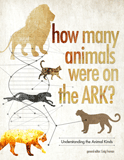Guppies: A Fish Story
If you have ever walked through the fish aisle of a pet store, you have likely seen guppies. They are widely colorful and readily available in pet stores. Yet did you know that evolutionists sometimes use these beautiful fish to advance their story? As they do so, they make a basic logical error that undermines the evolutionary tale.

Anton Melqkov [CC BY-SA (https://creativecommons.org/licenses/by-sa/4.0)]
Guppies are not only beautiful; they have been studied heavily in the wild. Hundreds of scientific papers have been written about guppies because researchers believe they demonstrate evolution in action. The usual study involves how guppy populations interact with natural predators, such as cichlids and killifish. Researchers found that guppies have babies younger and become adults faster in areas where there are a lot of cichlids. When only killifish are present, however, guppies mature more slowly and have fewer babies at a larger size. The researchers also found that the guppies that lived with cichlids were better able to avoid predators.
Based on the observations they made about the relationship between guppies and their predators, the researchers decided to do an experiment. They took guppies from habitats with cichlids and moved them into areas with only killifish. Within eleven years, the guppies had adapted to their new habitat. They grew up slower and had babies at a later age. However, these changes were not a result of changes in the guppies’ DNA as they only lasted a few generations when the guppies were bred in the lab apart from predators.
The researchers repeatedly used the word “evolution” to talk about these changes in the guppy populations. This reveals a fundamental logical error in using the word. The researchers are committing the logical fallacy (mistake) called equivocation. What that means is they are using the same word to mean two different things. They are using the term evolution to mean change and to mean molecules-to-man at the same time.
This change in guppy populations is not an example of molecules-to-man evolution. It is, however, a fine example of natural selection. The guppies simply adapted to their environment. No new traits were added. No new species were formed. No new information entered the guppy DNA. They simply adapted to their environment. Guppies do not make a good model for Darwinian evolution.
Recommended Resources
- © 2024 Answers in Genesis
- Privacy Policy
- Contact
- About


